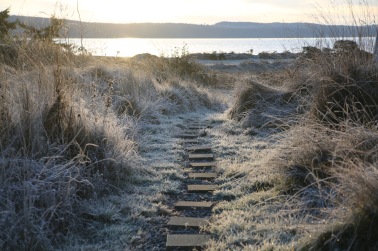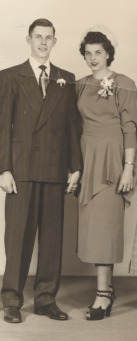It’s Thanksgiving, the day we all remind ourselves of our many blessings, and all the ways we appreciate our lives and the people in them. Some of us use the entire month of November to reprogram our hearts to remember these things consciously. Every day.
I am grateful today to have been raised by grateful parents. They grew up in a time when they were not assured that there would be enough food, warm clothes, or even a place to sleep. This early deprivation did not make them bitter or scared, but it did make them supremely grateful. And mindful.
Mindful is not a word we used back then. Everyone was living their lives and raising their kids the best they could. “Mindfulness” would have been the foolish notion of some distant cousin who traveled after college. In a raucous Irish-Catholic family, it would have been easy to get overwhelmed by the chaos, or discouraged by the constant struggle, but my parents mostly stayed present. Mindful. Mindful that these kids would not always be under their roof. (Though they did try to keep us there…) Mindful that health is not a given, and that tomorrow was not promised to anyone.
My mom was a labor and delivery nurse. She delivered many babies in our small town hospital, waiting for the doctor to arrive. She used to say, “Every healthy baby is a miracle.” She understood all the ways a delivery could go wrong, and all the reasons to celebrate when it didn’t. She baptized sick babies on the sly, when no one was looking. No child was going to Limbo on her watch. She came home every night exhausted and full of purpose. We were not allowed to leave the table without thanking her for the dinner; we had to write thank-you notes to grandparents for gifts, even if we didn’t like the sweater; we said grace before every meal. Her children would be grateful.
When she had cancer surgery in her forties, the doctor told her to go home and “get her affairs in order.” She did come home. She gathered us up and said, “You are probably going to hear rumors about me, but don’t believe them. I’m sick right now, but I’m going to be fine.” After resting a couple of days to recover from the surgery, she got up one morning, did her hair, put on lipstick and went to the A&P grocery store. “Dinner wasn’t going to make itself,” she said. But she didn’t really buy many groceries. She walked up and down the aisles, greeting people, assuring them that she was fine now, making a public appearance to disprove the rumors that she was dying. She came home, collapsed on the couch and said, “That should hold them for awhile.”
She recovered from that cancer and lived thirty-three more years. Not a single day went by that she wasn’t grateful for that particular day, for the chance to be with her family, for the food on her table, and for the love of friends.
My dad was in a car accident at nineteen, tossed onto railroad tracks. The doctors said his spinal cord injury was serious. They had stabilized his spine with a metal rod . (We used to trace the scar on his back. He called it his “thermometer scar.”) They told him he wouldn’t walk again, he would never work, and forget about getting married or having kids. He would probably be bed ridden, if he lived very long.
My mother was one of the many student nurses who helped him recuperate. Dad’s brother, John, arranged a rotating schedule of these students to come over and “walk my brother back and forth” for months after the accident. When my mom graduated and moved to Michigan for a nursing job, Dad saved his money, bought a diamond ring (“I paid five dollars a month on it until it was paid off…”) and hitchhiked – on crutches — to Ypsilanti where he proposed. He worked as a taxi driver, which didn’t require walking. He learned to walk without crutches to surprise her when they got married, and a couple of years later my sister was born. They moved back to northern New York, and settled in Ogdensburg where his mother lived. Where Mom could work at the same hospital where she got her training, and where he could find work at the paper mill.
It never occurred to us to use words like “disabled” or “crippled,” and Dad never complained about the debilitating back pain he experienced all his life. He worked at that paper mill most of his career, and said only how much he loved it, not how hard the work was. He walked the length of that building – probably an acre of space – many times a shift, and worked every double they ever offered him, happy to be able to support his family. He was persistently grateful for the job, and it was a matter of pride that he “never took a dime of disability from the government.” He never failed to appreciate a good meal cooked for him, a Christmas gift (however off the mark), or the chance to hold a grandchild on his lap. He could have been a very bitter man, but he was overwhelmingly grateful for
the life he had and the many years he had to enjoy it. When we were kids he would come upstairs at night, go into the bedroom and close the door while he changed into pajamas, then open the door and kneel down to say his nightly prayers. He knew we could see him– a tall man at six-feet-four – and he wanted us to see him end the day grateful to God.
So today, on our national day set aside for such things, I am grateful to be born and raised by these two who so deeply understood the blessings of their lives. People ever mindful that each good thing is a tiny piece of grace, and every hard thing is a chance to persevere. People for whom every day was a gift, and every evening a Thanksgiving.


